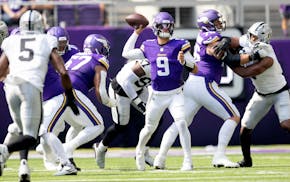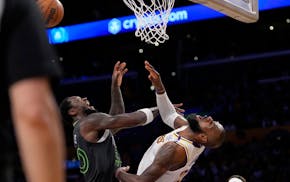Sometimes, she puts a hand in their face. Sometimes, she rebounds. Always, she needles, cajoles, jokes.
"Sometimes," Katie Smith said, "I think the best defense of all is to make them laugh."
For an hour before most every Lynx practice, Smith, the team's associate head coach, works on shooting with Kayla McBride and Bridget Carleton, among others.
Smith helped both surpass her team record for most made three-pointers in a season, as they transformed the way the Lynx play offense.
"I have the easiest job in practice," Smith said with a smile. "I rebound for them. Which means taking the ball out of the net."
Carleton and McBride have long been considered modern 3-and-D players — meaning they could shoot three-pointers and excel on defense. Alanna Smith was a late-blooming post who neither frequently shot nor frequently made three-pointers.
Want to know why the Lynx have exceeded expectations and enter the WNBA playoffs as the No. 2 seed?
The excellence of Napheesa Collier and the savvy of point guard Courtney Williams rank high, but the biggest change has been in three-point shooting.
This season, Carleton and McBride were the two best volume three-point shooters on the team that led the WNBA in three-point percentage, at 38.0%. Last year, the Lynx finished 11th in the 12-team league at 32.5%.
Alanna Smith entered this season with a career three-point percentage of 24.9% and easily set a career best by making 39.8% in 2024. Reserve Cecilia Zandalasini returned to the WNBA for the first time since 2018. Her career three-point percentage was 38.3% entering 2024, when she made 44.3%.
With Collier operating near the paint and Williams excelling at clutch two-pointers, Carleton, McBride and Smith became proficient at the most effective play in basketball.
What was it like for Katie Smith to help players break her record? "It's awesome," said Smith, the Naismith Memorial Basketball Hall of Famer and five-time All-Star with the Lynx, speaking animatedly after practice Saturday. "They're such a joy to work with. First of all, they're great shooters, but it's kind of fun to nitpick and build their confidence and how they can exploit defenses. At the end of the day, I just want them to keep shooting."
Smith dropped a coaching phrase: "shot credibility." Being able to make three-pointers offers the obvious benefit of maximizing the scoring potential of a possession, as well as the secondary benefit of forcing defenses to scramble wildly to cover players 25 or 30 feet from the basket, stretching defensive concepts and defenders' lung capacities.
"Shot credibility is huge, and creates so many other things for them," Smith said. "I'm so lucky to work with them. They're just such great people. They work so hard, and they bring a lot of joy. I just want them to have the utmost confidence in every situation."
A season of sharpshooting culminated when Carleton confidently swished a 34-foot three-pointer in the waning seconds to beat Connecticut on Tuesday and secure the No. 2 seed.
Carleton took a pass from Collier, who was asking for a return pass. Carleton turned and shot with confidence, and only later realized just how far she had been from the basket.
This season, Carleton produced career bests in points (9.6) and minutes (29.9) per game. What's interesting is that while she improved her three-point shooting percentage from 33.7% last year to 44.4%, she didn't match her career best in that category — 45.7% in 2020, the last year the Lynx advanced to the league semifinals.
In McBride's first 10 years in the league, she had made the All-Rookie team and three All-Star teams. She was coming off a 2023 season in which she made 34.2% of her three-point shots, tied for her lowest mark since 2017.
This year, she made better than 40% of her three-pointers (40.7%) for the second time in her career and first time since 2019.
"We love coming to work with Katie," McBride said. "She's a Hall of Famer, so everything she says, we take to heart."

Souhan: Wild lose an admirable one, and it might become a costly one

Souhan: Vikings picked a good year to not need to pick a quarterback
Souhan: What should the Vikings do with the No. 24 pick - keep it or trade it?
Souhan: Wild scorers look slick but lack grease in Game 1

